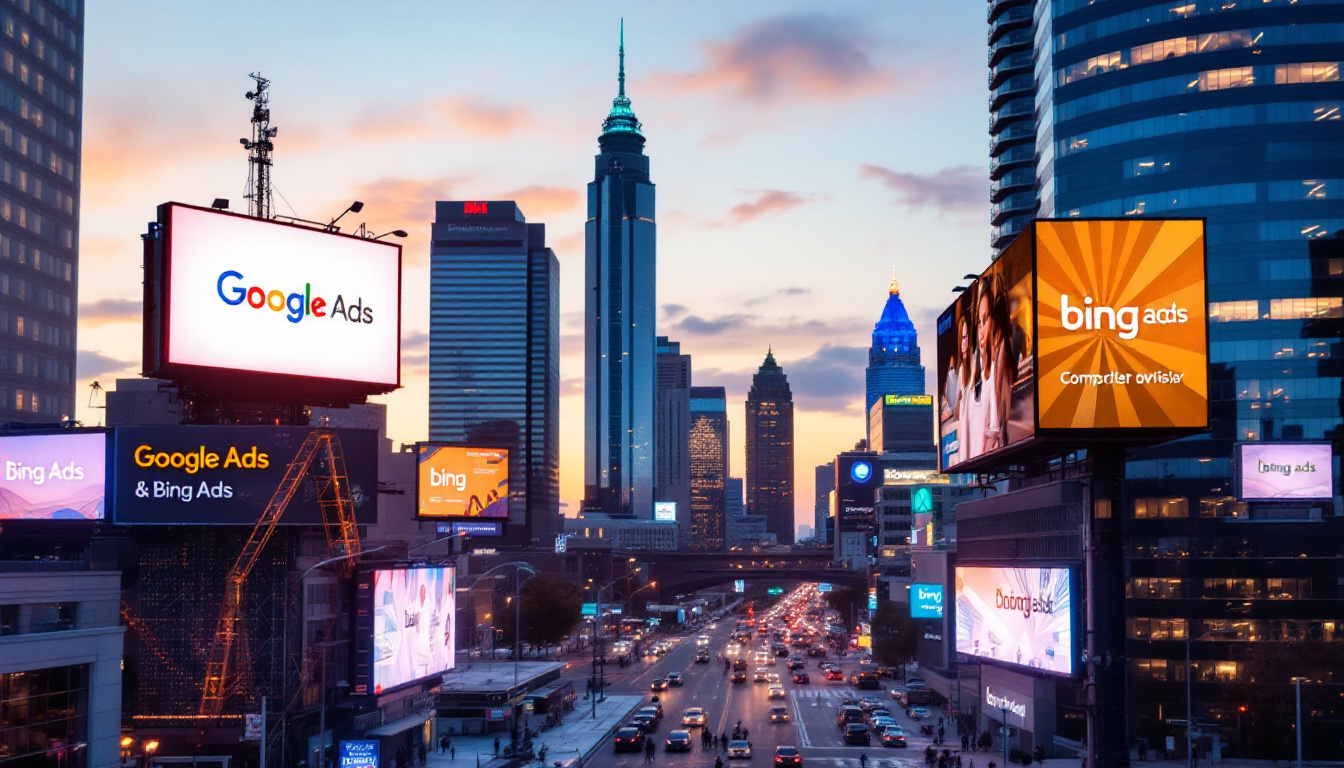10 Quick PPC Tips for Small Businesses in Detroit, MI

PPC, or pay-per-click advertising, is a powerful tool for small businesses looking to increase their visibility and drive traffic to their websites. In Detroit, where competition can be fierce, mastering PPC can give you the edge you need to stand out. Here are ten quick tips to improve your PPC campaigns and ensure your small business thrives.
Tips for crafting compelling ad copy
Creating ad copy that captures attention is essential in the crowded digital landscape. Your ad needs to resonate with your target audience while clearly conveying your message. Here are a few tips to make your ad copy compelling:
- Understand your audience: Conduct research to know who your potential customers are, what they care about, and how your product or service meets their needs.
- Use strong calls to action: Phrases like "Buy Now", "Get Started", or "Learn More" prompt users to take immediate action, increasing the likelihood of clicks.
- Focus on benefits, not features: Instead of listing features of your product, emphasize how it can improve the user's life or solve their problems.
Crafting ad copy requires a blend of creativity and strategy. Regularly testing different headlines and descriptions can help you identify which elements resonate most with your audience. Additionally, consider the emotional triggers that can be leveraged in your copy. Words that evoke feelings such as happiness, urgency, or curiosity can significantly enhance engagement and drive conversions.
Incorporate keywords effectively
Keywords are the backbone of PPC advertising. Make sure to incorporate relevant keywords naturally into your ad copy. However, don’t overstuff them; the copy should remain engaging and easy to read. Position important keywords at the beginning of your ad text to catch users’ attention.
Additionally, consider using dynamic keyword insertion, which automatically updates your ad text to include the user’s search query, making your ad more relevant and increasing the chance of clicks. This technique not only enhances relevance but also creates a sense of personalization that can lead to higher engagement rates. Furthermore, analyzing keyword performance regularly can provide insights into trends and shifts in consumer behavior, allowing you to adapt your strategy accordingly and stay ahead of the competition.
How to use geo-targeting effectively
Geo-targeting allows you to serve your ads to users in specific locations. This is especially valuable for small businesses in Detroit, as it helps focus your efforts where they matter most. Here’s how you can leverage geo-targeting:
- Define your target zones: Identify neighborhoods or areas in Detroit where your potential customers reside or frequently visit. Tailor your ads to those communities.
- Utilize local language: Incorporating local slang, landmarks, or references can make your ads more relatable to residents in those targeted areas.
- Monitor performance: Regularly review the performance of your geo-targeted ads. Adjust your targeting based on which areas yield the best results.
This localized approach not only improves your ad performance but can also enhance customer relationships by showcasing your commitment to the community. By engaging with your audience in a way that resonates with their daily lives, you foster a sense of trust and loyalty that can translate into repeat business. Furthermore, being seen as a local business that understands the unique needs and preferences of its community can set you apart from larger, less personalized competitors.
Combine with other targeting methods
Don't solely rely on geo-targeting; consider combining it with other targeting methods such as demographic or interest-based targeting. This will enhance your outreach, ensuring that your ads are not only seen by the right people but also by those likely to convert. For instance, if you own a coffee shop in Midtown, you could target ads specifically to young professionals who work nearby, emphasizing your quick service and cozy atmosphere. Additionally, seasonal promotions can be tailored to coincide with local events or festivals, further increasing the relevance of your ads.
Moreover, leveraging data analytics tools can provide insights into customer behavior and preferences within your targeted zones. By analyzing metrics such as foot traffic patterns or online engagement rates, you can refine your marketing strategies and make informed decisions about where to allocate your resources. This data-driven approach not only maximizes your advertising budget but also ensures that your campaigns resonate with your audience, ultimately driving higher engagement and conversion rates.
Best practices for budget allocation
Effective budget allocation is a crucial component of a successful PPC campaign. Allocating your budget wisely can significantly impact your return on investment. Here are some best practices:
- Set a clear budget: Determine how much you are willing to spend on your PPC campaign before you start. This helps in managing your expectations and spending.
- Allocate based on performance: Monitor your campaigns regularly and adjust your spending based on performance. Channels or keywords that drive conversions should receive a larger share of your budget.
- Consider seasonal fluctuations: Be prepared for shifts in consumer behavior during different seasons or holidays. Adjust your budget accordingly to capitalize on busy periods.
Budget allocation should not be static. It’s essential to be flexible and make adjustments based on your ongoing analysis of what's working and what's not. For instance, if you notice that certain ads perform exceptionally well during specific times of the day or week, consider reallocating your budget to focus on those peak performance periods. This dynamic approach can lead to improved results and a more efficient use of your resources.
Additionally, it’s beneficial to segment your budget across different campaigns and ad groups. By diversifying your allocation, you can test various strategies and identify which ones yield the best results. This method not only mitigates risk but also allows for a more comprehensive understanding of your audience's preferences and behaviors, ultimately leading to more informed decisions in future campaigns.
Use bid strategies wisely
Determining the right bid strategy can also affect your budget. Whether you choose to use manual bidding, automated strategies, or target CPA bidding, make sure it aligns with your overall campaign goals. Regularly revisiting and adjusting your bidding methods can save you money and enhance visibility. For example, automated bidding strategies can help you optimize your bids in real-time, adjusting them based on competition and performance metrics, which can be particularly useful in highly competitive markets.
Moreover, consider experimenting with different bidding strategies across various platforms. Each advertising platform may have unique features that can influence your bidding effectiveness. By testing out different approaches, such as enhanced CPC or maximizing conversions, you can find the most effective strategy tailored to your specific objectives. This experimentation not only helps in fine-tuning your budget allocation but can also lead to discovering new opportunities for growth within your PPC campaigns.
Why testing is crucial in PPC campaigns
Testing is a fundamental aspect of optimizing your PPC campaigns. Without it, you risk missing opportunities for improvement. Here’s why testing should be a priority:

- Identify what works: Systematic testing allows you to compare different elements of your campaign – from ad copy to landing pages – to see which versions yield the best results.
- Reduce wasted spend: By identifying non-performing ads or keywords, you can eliminate wasted spending, ensuring your budget is used effectively.
- Adapt to market changes: Consumer preferences can change rapidly. Regular testing keeps you attuned to those shifts, enabling you to adapt your strategy as necessary.
Consider implementing A/B testing, where two versions of an ad are tested against each other to determine which performs better. This empirical approach can lead to significant improvements in your PPC campaigns.
Continually refine your approach
Testing isn’t a one-time effort; it should be an ongoing aspect of your PPC strategy. Regularly refine your approach based on your findings to maintain momentum and relevance in your advertising efforts.
How to use extensions to enhance ad visibility
Ad extensions are valuable tools that can enhance your PPC ads by providing additional information and increasing their visibility. Here’s how you can leverage them effectively:

- Utilize site link extensions: This allows you to include additional links to different sections of your website, making it easier for users to navigate and find what they need.
- Incorporate call extensions: Adding a phone number to your ads can encourage users to call your business directly, which can be especially beneficial for local services.
- Highlight offers with promotion extensions: If you have special offers or promotions, using promotion extensions can capture attention and entice users to click.
Utilizing extensions not only increases the amount of real estate your ad occupies on the search results page but also provides users with more reasons to engage with your brand.
Regularly review and update extensions
Make it a habit to review your ad extensions periodically. Ensure the information is current, and test different types of extensions to see which yields the highest engagement. This proactive approach can significantly enhance your PPC performance.
By implementing these ten quick PPC tips, small businesses in Detroit can maximize their advertising efforts, position themselves competitively, and ultimately drive better results. Remember, the key to successful PPC lies in continuous learning, testing, and adapting to ever-changing market dynamics.

As a Google Ads expert, I bring proven expertise in optimizing advertising campaigns to maximize ROI.
I specialize in sharing advanced strategies and targeted tips to refine Google Ads campaign management.
Committed to staying ahead of the latest trends and algorithms, I ensure that my clients receive cutting-edge solutions.
My passion for digital marketing and my ability to interpret data for strategic insights enable me to offer high-level consulting that aims to exceed expectations.






















